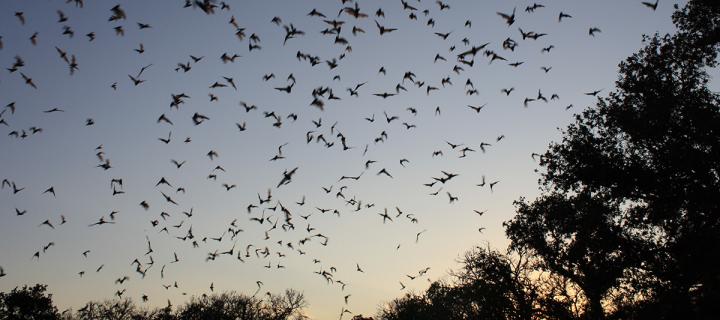Experts call for closer wildlife monitoring to prevent future pandemics
Global wildlife experts are calling for improvements to how pathogens are tested and tracked in wildlife, to reduce the risk of future pandemics.

Global wildlife experts are calling for improvements to how pathogens – organisms that cause disease – are tested and tracked in wildlife to reduce the risk of future pandemics.
Scientists from the Wildlife Disease Surveillance Focus Group – which includes University of Edinburgh experts – said that to avoid a repeat of Covid-19 wildlife must be tested closer to areas of risk, technology should be used better and the international wildlife trade needs greater oversight.
Previous outbreaks of new diseases – referred to as emerging infectious diseases – such as SARS and MERS were caused by the crossover of pathogens from animals to humans.
SARS coronavirus 2 (SARS-CoV-2) – the virus responsible for Covid-19 - is thought to have originated in bats and been passed through other wildlife hosts before moving into humans.
Better surveillance of wildlife viruses needed
The lack of knowledge about how the step between animals and humans happened highlights the need for improved surveillance, experts said.
At the moment there is no pathogen screening of wildlife trade, in either legal or illegal settings. This includes wildlife or wildlife products that are consumed as food, transported or hunted as game.
Experts said the lack of oversight is concerning. Some 89 per cent of known RNA viruses – the class of viruses that SARS-CoV-2, MERS coronavirus and Ebola belong to – that have the potential to cause harm to humans could cross over from animals.
Hunted and farmed animals often end up in wildlife markets with packed cages, poor disease control measures and sanitation, making them a breeding ground for disease.
The group has outlined its recommendations in an article published in the journal Science.
Rigorous wildlife disease surveillance, Science 369, 145-148
The experts argue for an increase in laboratory testing capacity at or near locations where humans and wildlife interact.
At the moment, 62 per cent of laboratories that screen for animal pathogens are located in North America and Europe. This does not reflect the areas with most risk of emerging infectious diseases, such as Asia and Africa, which respectively account for 26 per cent and 3 per cent of global testing laboratories.
Call for more testing capacity
The international experts said improvements in testing technology could help decentralise testing capcaity, for example by using portable DNA sequencers.
These small, cost-effective, devices can be used to rapidly detect wildlife pathogens in local testing centres, with wildlife and healthcare workers trained to conduct tests and submit results, the experts said.
Researchers at the University of Edinburgh are starting to trial this sequencing technology, working with the governments of Zambia and Malaysia, in a project led by TRACE Wildlife Forensics Network, a UK based NGO focusing on the application of forensic science to combat the illegal wildlife trade.
We now have the ability to identify wildlife pathogens quickly, safely and locally using DNA sequencing; the university will be working with TRACE and partners in Africa and Southeast Asia to transfer these technologies and enhance their disease surveillance capabilities.
The Wildlife Disease Surveillance Focus Group also recommended the creation of a central publicly accessible database for recording the characteristics of animal viruses to help monitor the risk of crossover to humans.
This would allow any scientist to see how pathogens are evolving, how common they are worldwide and identify early potential targets mitigation measures, including antiviral treatments or vaccines.
We know that many diseases like COVID19 can cross from animals to humans but we don’t focus enough on the animal side of the human-animal equation. Locally-driven surveillance and responses will empower local wildlife and public health professionals to constantly monitor for pathogens at source and improve the likelihood of prevention or early mitigation of future crossover events.
Finally, the group recommended establishing international standards for the wildlife trade, particularly around screening for wildlife and wildlife products that are transported elsewhere.
The Wildlife Disease Surveillance Focus Group includes wildlife experts from the Universities of Edinburgh and Melbourne, San Diego Zoo and Washington University in St. Louis.
Related links
TRACE Wildlife Forensics Network
Further information
Shane Canning, Press and PR Office, 07557 820266


